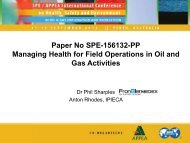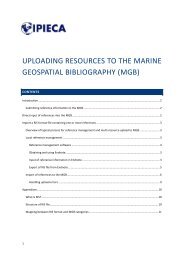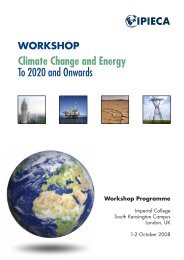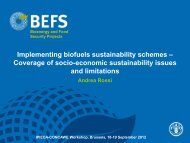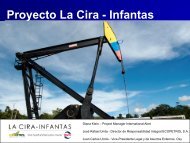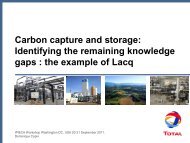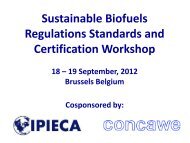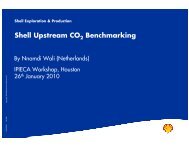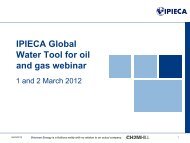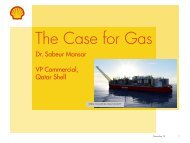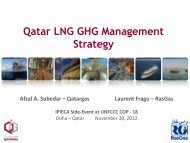WSSD Report FINAL! - OGP
WSSD Report FINAL! - OGP
WSSD Report FINAL! - OGP
Create successful ePaper yourself
Turn your PDF publications into a flip-book with our unique Google optimized e-Paper software.
THE OIL AND GAS INDUSTRY FROM RIO TO JOHANNESBURG AND BEYOND<br />
Water management<br />
Water management<br />
Background<br />
Despite a global annual renewable volume of<br />
41,000 cubic kilometres, freshwater is a scarce<br />
resource in many countries—particularly in<br />
its potable form. An estimated 1.1 billion<br />
people around the world lack access to safe<br />
water supplies.<br />
Continuing population growth is<br />
likely to make this problem even<br />
more acute, with conflicting<br />
demands for limited local and<br />
regional supplies. The UN estimates<br />
that water used by people is<br />
likely to increase by 40 per cent<br />
in the next 20 years, with<br />
growing urban and industrial<br />
sectors consuming more of the<br />
water previously allocated to agriculture<br />
and ecosystems. Currently,<br />
eight per cent of the world’s<br />
freshwater demand is for human<br />
health and sanitation purposes.<br />
Industry as a whole currently<br />
accounts for 20 per cent of all freshwater withdrawals,<br />
compared to agriculture, which<br />
accounts for nearly 70 per cent.<br />
Though no quantitative estimates of the oil and<br />
gas industry’s global use of freshwater are yet<br />
available, the total is likely to be a small proportion<br />
overall. However, in some parts of the<br />
world—desert areas in particular—our operations<br />
can be in conflict with the needs of other users.<br />
Overall, there is a concern that a decline in<br />
water available for irrigation will reduce food<br />
self-sufficiency, push the world’s total import<br />
needs beyond exportable supplies, and so create<br />
political and social instabilities in areas with<br />
food debits.<br />
Given this background, it is hardly surprising that<br />
the politics of water management are changing.<br />
The topic is high on the agenda in many United<br />
Nations forums. Key frameworks being addressed<br />
by the oil and gas industry include water<br />
resources assessment, drinking water supply, and<br />
sanitation and water use efficiency.<br />
Industry response<br />
Our ability to find water comes naturally.This<br />
skill involves much the same disciplines as<br />
finding sub-surface deposits of oil and gas.<br />
Near-surface geological information that<br />
comes with our exploration for deeper<br />
hydrocarbon formations often provides<br />
knowledge about previously unknown and<br />
untapped groundwater sources.<br />
Similarly, our experience in treating water to<br />
ensure its purity before being discharged to sea<br />
or injected into a reservoir gives us further<br />
opportunities to help local communities. In a<br />
number of cases, reed bed filters are used to<br />
naturally clean produced water, eliminating the<br />
need for additional processing technology. The<br />
resulting water can be used as a vital source of<br />
irrigation for local agriculture. In addition,<br />
produced water, if carefully managed, can be<br />
discharged to create environmentally important<br />
wetland habitats.<br />
Refineries have taken a very comprehensive<br />
approach to water management.Water management<br />
includes water procurement and<br />
treatment for process use, and effective in-plant<br />
source control and housekeeping measures to<br />
recycle, reuse, treat and discharge. Measures<br />
such as utilizing recycle systems that use water<br />
more than once can greatly reduce the volume<br />
required. Process modifications, such as replacement<br />
of barometric condensers, have reduced<br />
water consumption and contamination. End of<br />
pipe treatment uses best-demonstrated technologies<br />
currently available to manage and<br />
minimize the impact of the discharges to the<br />
aquatic environment.<br />
68



